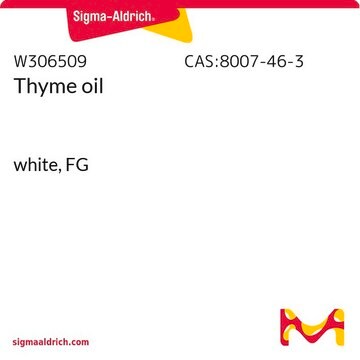W306606
Thymol
FCC, FG
Sinónimos:
2-Isopropyl-5-methylphenol, 5-Methyl-2-(1-methylethyl)phenol, 5-Methyl-2-isopropylphenol, IPMP
About This Item
Productos recomendados
biological source
synthetic
Quality Level
grade
FG
Halal
Kosher
agency
meets purity specifications of JECFA
reg. compliance
EU Regulation 1334/2008 & 872/2012
FCC
FDA 21 CFR 172.515
vapor pressure
1 mmHg ( 64 °C)
bp
232 °C (lit.)
mp
48-51 °C (lit.)
density
0.965 g/mL at 25 °C (lit.)
application(s)
flavors and fragrances
documentation
see Safety & Documentation for available documents
food allergen
no known allergens
organoleptic
spicy; phenolic
SMILES string
CC(C)c1ccc(C)cc1O
InChI
1S/C10H14O/c1-7(2)9-5-4-8(3)6-10(9)11/h4-7,11H,1-3H3
InChI key
MGSRCZKZVOBKFT-UHFFFAOYSA-N
¿Está buscando productos similares? Visita Guía de comparación de productos
Categorías relacionadas
General description
Application
Biochem/physiol Actions
Other Notes
Disclaimer
signalword
Danger
hcodes
Hazard Classifications
Acute Tox. 4 Oral - Aquatic Chronic 2 - Eye Dam. 1 - Skin Corr. 1B
Storage Class
8A - Combustible corrosive hazardous materials
wgk_germany
WGK 2
flash_point_f
240.8 °F - closed cup
flash_point_c
116 °C - closed cup
ppe
dust mask type N95 (US), Eyeshields, Faceshields, Gloves, type P3 (EN 143) respirator cartridges
Certificados de análisis (COA)
Busque Certificados de análisis (COA) introduciendo el número de lote del producto. Los números de lote se encuentran en la etiqueta del producto después de las palabras «Lot» o «Batch»
¿Ya tiene este producto?
Encuentre la documentación para los productos que ha comprado recientemente en la Biblioteca de documentos.
Los clientes también vieron
Nuestro equipo de científicos tiene experiencia en todas las áreas de investigación: Ciencias de la vida, Ciencia de los materiales, Síntesis química, Cromatografía, Analítica y muchas otras.
Póngase en contacto con el Servicio técnico








